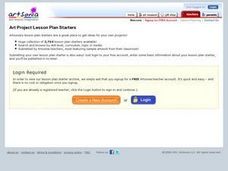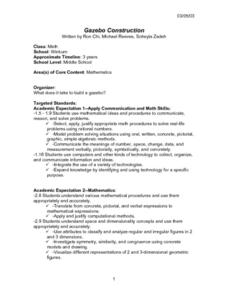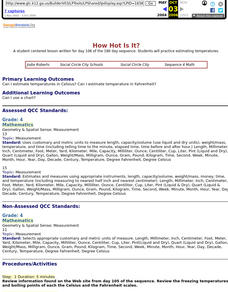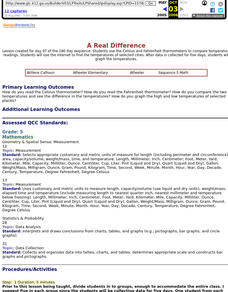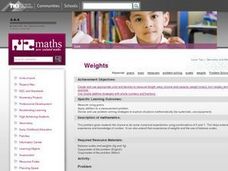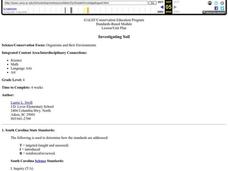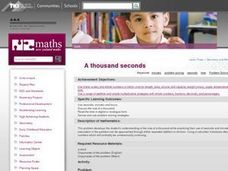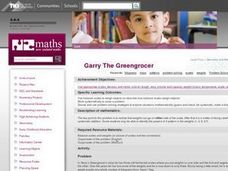Curated OER
Medieval Castles
Second graders design a scale model of a medieval castle and its surroundings including the following items: castle, moat, bailey, drawbridge, turrets, dungeon, grounds, and outer walls. A perfect lesson for those kids who are fascinated...
Curated OER
Geometry in Nature
Students examine how the circumference, diameter, and the relationship of Pi of a circle are related. They count the summer rings of a tree to determine its growth.
Curated OER
Seesaws
Students make direct comparisons between objects using balance and spring scales. They also are encouraged to estimate which object is heavier by holding the objects before using the balance scales. Comparing the masses of objects is the...
Curated OER
Gravity (Newton's Laws of Motion): A Weighty Subject
Students identify Newton's Laws of Motion. They students explore Newton's Laws of Motion and apply the second law with a classroom activity. The videos will provide visual examples of the effects of gravity while riding on a roller coaster.
Curated OER
Gazebo Construction
Students create and give oral proposals for the construction of a gazebo using a blueprint created with Geometer's Sketchpad. They then build a gazebo model using the blueprints created and provide evidence why it should be selected for...
Curated OER
Too Many Tamales
Pupils investigate Mexican holiday celebrations and compare them to American Christmas holidays. They conduct a Mexican Christmas Scavenger Hunt. The activity uses a streaming video in order to engage students in the main objectives.
Curated OER
Paper Planes
In this unit, 3rd graders investigate one variable to see if they can make a paper plane fly farther. They use scatter plots to establish a possible relationship between variables then use what they have found to make a paper plane to...
Curated OER
Travel Mug Design
Students create and develop a travel mug. They create visuals and a three dimensional infomercial. They apply an engineering design and demonstrate knowledge of thermodynamics involved in heat transfer. They illustrate Newton's Law of...
Curated OER
Clockwise
Second graders investigate angles through this series of lessons. They determine how angles turn in both clockwise and anticlockwise directions. They examine the characteristics of quarter half turns and how they can begin from any...
Curated OER
Trains
Pupils compare the lengths of the train through calculation. This calculation can be done by knowing the values of the rods. Students use problem solving to get the answer to the problem before them.
Curated OER
What's Your Line?
Fifth graders collect temperature readings over a period of time, enter the information into a spreadsheet and choose the appropriate graph to display the results.
Curated OER
How Hot Is It?
Fourth graders practice estimating temperatures. They practice in Celsius and Fahrenheit.
Curated OER
A Real Difference
Fifth graders use the Celsius and Fahrenheit thermometers to compare temperature readings. They use the Internet to find the temperatures of selected cities. After data is collected for five days, 5th graders graph the temperatures.
Curated OER
Our Class Record Book
Second graders, in groups, prepare a list of proposed record ideas for the class book.
Curated OER
How much room?
Students examine the amount of usable space that exists in their classroom using square meters and square centimeters. They apply the information to predict the ideal size of a classroom.
Curated OER
Weights
Students find an object that they estimate weighs 20g and check estimates on the balance scales. They read the problem and work in pairs focusing their understanding on the size of grams.
Curated OER
Investigating Soil
Fourth graders swap local soil samples with another school and examine the differences. They research soil properties, identify organisms that live in soil, create and maintain a biome of soil decomposition and design a poster to present...
Curated OER
Houses
Third graders use a number of problem solving strategies in this unit of lessons. They determine how to draw and model three-dimensional objects, use co-ordinate systems, determine probability of events, and identify paths of simple...
Curated OER
Worms and more
Students have early length experiences must develop an awareness of what length is, and of the range of words that can be used to discuss length. Young children usually begin by describing the size of objects as big and small. They...
Curated OER
Prints and Outlines
Learners determine the area of two objects by superimposing one on the other. They compare and order the area of different shapes by covering a larger shape with similar smaller ones. They complete these activities as different stations.
Curated OER
Visiting Grandma
First graders investigate the aspect of time, including days of the week using a calendar. They use problem solving strategies and a monthly calendar to find a solution to the problem.
Curated OER
A thousand seconds
Pupils use seconds, minutes, and hours. They then discuss the size of a thousand. After that they read time in digital or analogue form.
Curated OER
Parking Meters
Third graders are introduced to the problem with a short discussion about parking. They then solve with a partner. As they work ask questions that focus on the strategies they are using to make the calculations.
Curated OER
Garry The Greengrocer
Fourth graders are introduced to the problem by weighing objects on the balance scales. Use weights in both pans. (If you don't have access to scales use 2 containers and a child acting as the balance.) They then listen to the problem...
